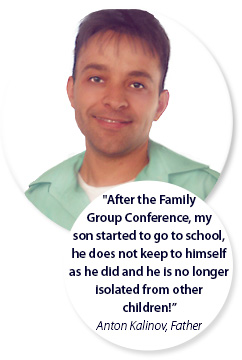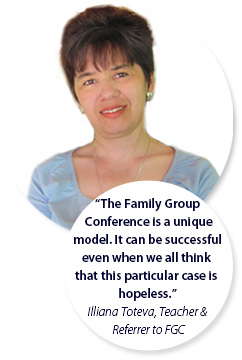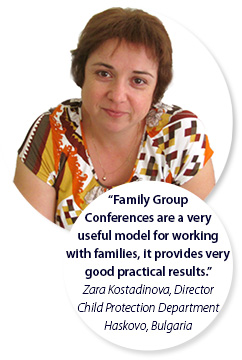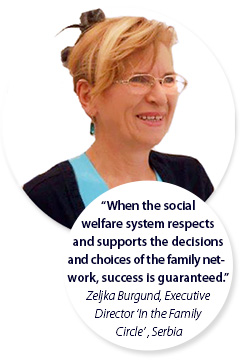“Who visits Mr. Schmid?” Family Group Conference to care for an elderly gentleman.
Mr. Schmid is 87 years old and lives in a nursing home; he is widowed and has no children. From time to time he gets visits from his former neighbor Mrs. Hügel and his pastor Mrs. Maier. He has a legal guardian, Mr. Armle, and a niece, Mrs. Schäfer; he hardly sees either of them. Most of his friends have passed away. Mr. Schmid is often confused and doesn’t even know where he is. The nursing home has experience with residents with dementia, but is not specially equipped to work with these needs. Mr. Schmid’s most fervent wish is to get to his wife’s grave, but he can no longer leave the house on his own. Every time the neighbor visits, he seems more disoriented and desperate. He has had toothache for months and no one seems to respond. The neighbor has the impression that neither the home, nor the niece, nor the caregiver care about Mr. Schmid. She proposes a FGC to the caregiver, who asks skeptically what the point is, but agrees.
The question for the FGC is: How can family, friends and professionals support Mr. Schmid in a more targeted way? How can necessary doctor’s visits be organized? The preparation starts slow,everyone is difficult to reach. Perhaps they are afraid that someone will reproach them or that they will have to take on more tasks? In the preparatory talks with the FGC coordinator, the various reservations are clarified. The coordinator does not talk to Mr. Schmid at the request of all participants, because this would confuse him very much. Finally, the FGC in the nursing home. Mr. Schmid is represented with a picture and his favorite jacket. The niece is accompanied by her husband and a daughter, the neighbor, comes with the pastor and the former chiropodist, who also visits Mr. Schmid. In the information phase, the legal guardian presents his competences. With astonishment everyone hears that for the care monthly only one hour is payed. Afterwards, an employee of the nursing home presents the scope of the care and possible additional services. Then private family time begins. The people later report that the others are “really nice people.” “You have to talk to each other” is the tenor of the feedback. The mood is noticeably more relaxed. The plan specifies, among other things, which additional services are to be financed, how capacity for the necessary care can be clarified, who will take responsibility for dental visits, what ideas there are for additional visits to Mr. Schmid and, above all, the niece and her daughter want to accompany Mr. Schmid to his wife’s grave next weekend. Three months later, the group meets again: Mr. Schmid is flourishing. He has been to the dentist, visited his wife’s grave and the more regular visits help him to be less confused. Those involved have a good exchange with each other and even the legal guardian, has overcome his initial skepticism and writes in a message, “I expressly welcome the FGC you initiated and am happy to recommend it.”
A story from Germany
<< back to overview




